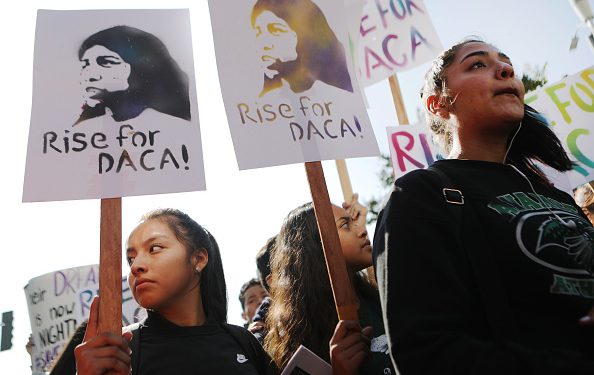By Sam Dorman
Updated:
The U.S. Court of Appeals for the Fifth Circuit heard oral argument on Oct. 10 over the federal government’s attempt to restore President Joe Biden’s protections for so-called “dreamer” immigrants after a Texas judge blocked them from taking effect.
The federal policy is intended to prevent the deportation of illegal immigrants who came to the United States as minors. Nearly 600,000 of them have enrolled in the Deferred Action for Childhood Arrivals (DACA) program, and more than 100,000 live in Texas.
Many of the arguments surrounded whether Texas had standing to challenge Biden’s policy, which he enacted in 2021 as a continuation of a similar one under former President Barack Obama.
Standing is the legal requirement that requires experience of some injury or harm as the basis for bringing the lawsuit.
According to Texas, the administration had violated the Immigration and Nationality Act, the Administrative Procedures Act, and a portion of the Constitution requiring that the president execute the nation’s laws.
Bryan Boynto, U.S. Department of Justice’s principal deputy assistant attorney general, had argued that recent Supreme Court decisions clarified that standing was narrower than a district court had construed. Judge Jerry Smith expressed skepticism about Boynto’s argument.
“I just don’t see how you’re getting very far with that argument,” Smith told Boynto. “Obviously, you can spend time on it if you want to.”
The administration’s policy fueled this problem, it argued, “by encouraging over 100,000 aliens who would otherwise be legally required to leave to remain in Texas.”
Boynton said during oral argument that the harm Texas faced wasn’t direct enough and that instead, it faced the kind of indirect harm that the Supreme Court had dismissed as insufficient.
Judge Stephen Higginson seemed to agree with Boynton, saying the injuries alleged by Texas were identical to the ones at issue in the Supreme Court case.
Higginson was skeptical of arguments by Joseph Mazzara, a lawyer for Texas and the other states, that rescinding DACA would push recipients to voluntarily leave the country and save states money.
New Jersey Solicitor General Jeremy Feigenbaum urged the panel of three judges to consider how ruling against the administration would impact DACA recipients.
The nationwide injunction issued by the lower court, Feigenbaum said, was inappropriate.
“Texas has simply done nothing in this record to explain why it’s being injured today from a current DACA recipient who’s been a part of DACA since 2012, who lives in New Jersey, or who lives in New York,” Feigenbaum said.
Higginson also questioned the nationwide scope of the district court ruling, appearing to agree with the Biden administration’s argument that if the decision is upheld it should be limited to blocking DACA in Texas.
Whatever the court decides, it could end up at the Supreme Court.
On the day of oral argument, Senate Judiciary Chairman Dick Durbin (D-Ill.) said he would “always stand up for Dreamers” and urged Republicans to pass the DREAM Act in order to create a permanent pathway to citizenship for DACA recipients.
In May, the Biden administration also finalized a rule to allow DACA recipients to be covered under the Affordable Care Act, also known as “Obamacare.”
Texas, meanwhile, has said that the executive branch has attempted to exercise legislative power it does not have.
“In DACA, the president has dispensed with Congress’s carefully delineated immigration policies in favor of [his] own preferred legal regime,” it said in a brief to the Fifth Circuit.






